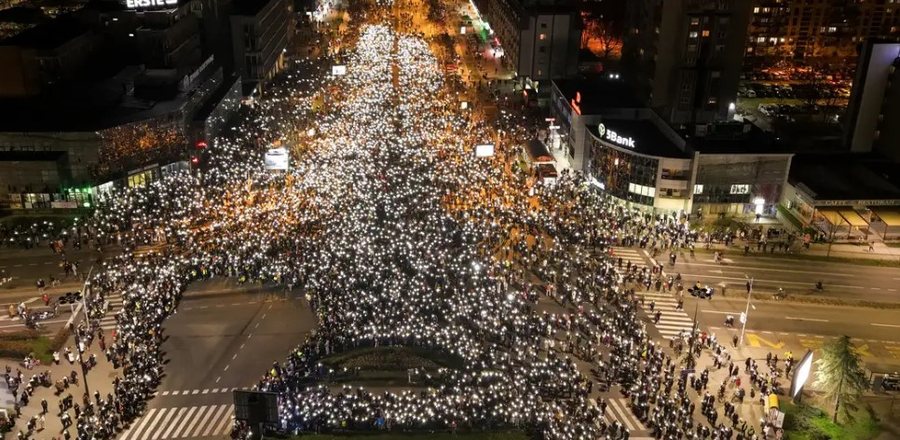
The political crisis in Serbia is deepening. Last Tuesday, Serbian Prime Minister Miloš Vučević resigned. Meanwhile, tens of thousands of demonstrators gathered in Novi Sad last week to mark the third anniversary of the death of 15 people when a roof collapsed at a train station in the city.
The prime minister resigned after widespread protests, but that is unlikely to satisfy the protest movement, the students and hundreds of thousands of other people who have been protesting for three months. The students and demonstrators want more - they want deep reforms and hope for a change in politics in Serbia, which is close to Russia, writes Fabian Eberhard, editor-in-chief of the weekly edition of the Swiss newspaper Blik.
Vučić regime's wiretapping
Serbian President Aleksandar Vučić has clung to power and is using extremely controversial methods in an attempt to quell protests and prevent his downfall. In late 2024, human rights organization Amnesty International and investigative network BIRN reported that his government was monitoring activists and journalists. According to an analysis of the data, Serbian authorities have illegally installed spyware on dozens of phones of critics of the regime, the newspaper reports. The surveillance programs downloaded photos and text messages, and tapped the microphones and viewed the cameras of Vučić’s opponents.
Serbia's Interior Ministry and intelligence service (BIA) have dismissed the accusations as "nonsense" and "inaccurate." But suspicions remain.
Spy technology worth two million francs
Recent research shows that the Serbian government is also relying on Swiss technology for its spying operations. In 2023, Swiss authorities approved the shipment of so-called IMSI-catchers to Serbia, worth almost two million francs. These highly sophisticated devices enable location detection, interception and monitoring of mobile phones. These are devices that can be used to read the International Mobile Subscriber Identity (IMSI) from a mobile phone’s SIM card and determine its location within a specific cell of the mobile network. It is usually used in the fight against crime.
The Swiss Secretariat for Economic Affairs (Seco) confirmed the delivery of the equipment. According to spokesman Fabian Mayenfisch, the surveillance equipment was exported to state institutions in Serbia. He did not specify, but it was probably the Ministry of Internal Affairs or the BIA intelligence service. It is also not known which Swiss company implemented the contract.
Blik writes that the sale of Swiss surveillance technology to the Serbian state is questionable. The Regulation on the Export and Brokering of Goods for Internet and Mobile Surveillance prohibits distribution if there is reasonable suspicion that the technology will be used for repression in the country of the end user.
Today exports would probably be rejected.
For the decision to export the IMSI, Seco consulted with the Ministry of Foreign Affairs (EDA), the Ministry of Defence (VBS) and the intelligence service (NDB). In the end, the government gave the green light. Seco spokesman Mayenfish said: "During the individual review there was not sufficient evidence that the user would use this technology for pressure and oppression."
Today, perhaps the verdict would be different. The evidence that the authorities in Serbia are using spyware against critics of the regime is now abundantly clear. Activists and journalists were summoned to the police for so-called "information interviews," a communist-era practice in which opposition figures were questioned without a clear reason. According to a report by Amnesty International, the Israeli software Pegasus was also used by the police, as was the Serbian surveillance software Novispy.
Now only Vučić remains.
Serbian President Aleksandar Vučić is increasingly governing using authoritarian methods. The media, judiciary and administration are largely under the control of his loyalists. But protests that began three months ago are now seriously threatening even that. The country is witnessing the largest demonstrations since the uprising against Slobodan Milošević in 2000.
Vucic, who has been in power in various capacities since 2012, has accused the protesters of being under the control of foreign intelligence services.
With the resignation of Prime Minister Miloš Vučević, the Serbian government hopes to appease the opposition. Will this sacrifice of the prime minister help? After his resignation, the protests have continued. The protest movement has only one person to blame for the situation in the country: Aleksandar Vučić, concludes Blik. DW
(A2 Televizion)











